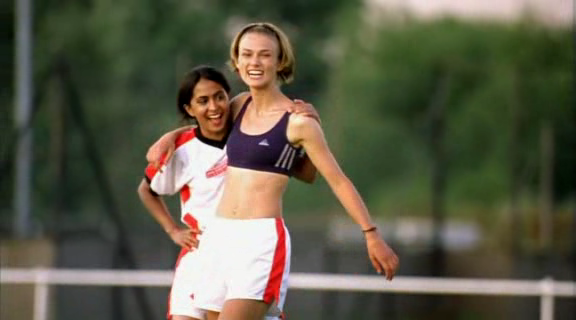39. Bend It Like Beckham, directed by Gurinder Chadha
Using Your Balls To Kick Goals
By Rose Marel
It’s rare that the movies you repetitively binged on during childhood can translate effortlessly into your adulthood. Most are unable to survive the leap, and those once-loved, brightly burning films become a lesser version of themselves. Those are the ones better remembered, not revisited, lest you burst the nostalgic illusion. But… there are exceptions. Bend It Like Beckham, one of my standard and adored go-to films during my tweens, remains just as delightful and pertinent as ever. Yes, it’s still delightfully humorous, delightfully touching and delightfully inspiring, regardless of whether you’re nine or sixty-nine.
Our heroine, Jess (Jesminder Bhamra, played by Parminder Nagra) is the younger of two daughters, born and raised in London and brought up by Punjabi parents. More concerned with soccer than she is with either boys or learning to cook aloo gobi, Jess doesn’t quite fit the expectations of her family or the community around her. Schooling the guys she regularly plays with in the park, Jess is essentially scouted by another young football fanatic Jules (Keira Knightly) to play in an all-female local league. Jules becomes the force that cracks Jess’s ambitions wider, introducing her to an entirely new level of sport and sisterhood. Only – with Jess’s disapproving parents to consider – the contradiction between their values comes to the fore, and begins a new navigation of cultural and personal identity.
Beyond Jess’ own journey, the film also explores the generational divide which is widened by environmental and social impacts. As a second-generation Indian, Jess negotiates two different cultures, and at times, struggles to find the harmony between them. Traditional Indian music infuses the film with an authenticity, while shots of urban London highlight the multicultural nature of the twenty-first century. The film also plays with colour, as we’re inundated visually with bright Indian attire, which juxtaposes the basic sports clothes or street gear preferred by the players. Pushing back at her mother’s expectations of a traditional Indian daughter, we watch as Jess shuns the mould cast for her, as she realises that the more it’s forced, the more discomfort it causes.
A lot of the humour derives from Chadha’s exaggeration of the cultural aspects of the story. Jess’ mum, for example, is a barrel of laughs, pumped up to almost caricatural proportions, while somehow still retaining a truth and tenderness that’s endearing. Some of the best quotes belong to Mrs. Bhamra but, despite the comedic value, we come to realise that her restrictive viewpoint stems from a place of love, misunderstanding and concern. She acts as another strong female, whose own upbringing has shaped the perspective she now wants to pass on to her children.

Capturing tricky skills and sure-fire passes, the soccer scenes are action-packed, with cameras whizzing around in a dynamic detailing of the skill involved. It’s an ode to athleticism, showcasing the girls as strong, determined and relentless in their determined efforts towards excellence. Chadha even manages to squeeze excitement from soccer drills, enlivening the scenes with fast-paced music and quick cuts. You don’t have to be a football fan to enjoy the sporty element of the film, and here Chadha suggests that the soccer is merely a metaphor for the larger message of fighting for your dreams.
Jess is relentless too in this fight. She refuses to be ground down, and with every knock-back she feels a breath of hope and, one breath at a time, Jess struggles towards her goals. The friendship between Jules and Jess proves to be an invaluable one, with both girls using each other’s shoulders as a support and bolster onto the next challenge. The dynamic between these two lead actresses is fabulous, alive and authentic, making us invest further in their story and characters.
This film is interesting on so many levels. The mother-daughter and sister-sister relationships, as well as friendships, are all complex and believably formed. Affection is offset by competitiveness or jealousy, and support is hardened by betrayal. Jess’ mum becomes a foil to Jules’ mum, and for all their differences, they’re surprisingly similar in their concerns for their daughters to fit in to the separate worlds their mothers wish for them to inhabit.

Tenaciously pursuing your dreams is a moral that retains its relevance today, and transcends cultural background. Of course, the film may hold more relatability for certain people, such as second-generation immigrants. From my naive Caucasian perspective, this film was a favourite when I was a child because it was fun and inspiring, but for someone caught between ethnic backgrounds or struggling with forced assimilation, this movie would provide an inspiration of immediate relatability. Ultimately, people crave for their experiences to be shown on screen as a provider of hope or a sense of belonging. Like a form of visualisation, it may make us feel less alone to know that our problems can be overcome.
Striking the balance between comedy and drama in Bend It Like Beckham, the themes are really able to resonate. Jess shows us that external obstacles like family and gender are not the only ones we must overcome, but to really achieve your dreams you must also recognise the internal barriers like self-doubt. The trajectory of your life’s journey is not up and down or in a straight line. It’s a curve; a bend; a discovery in flight. Beckham’s kicks might not always reach the net, but they sure do bend.